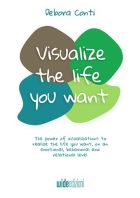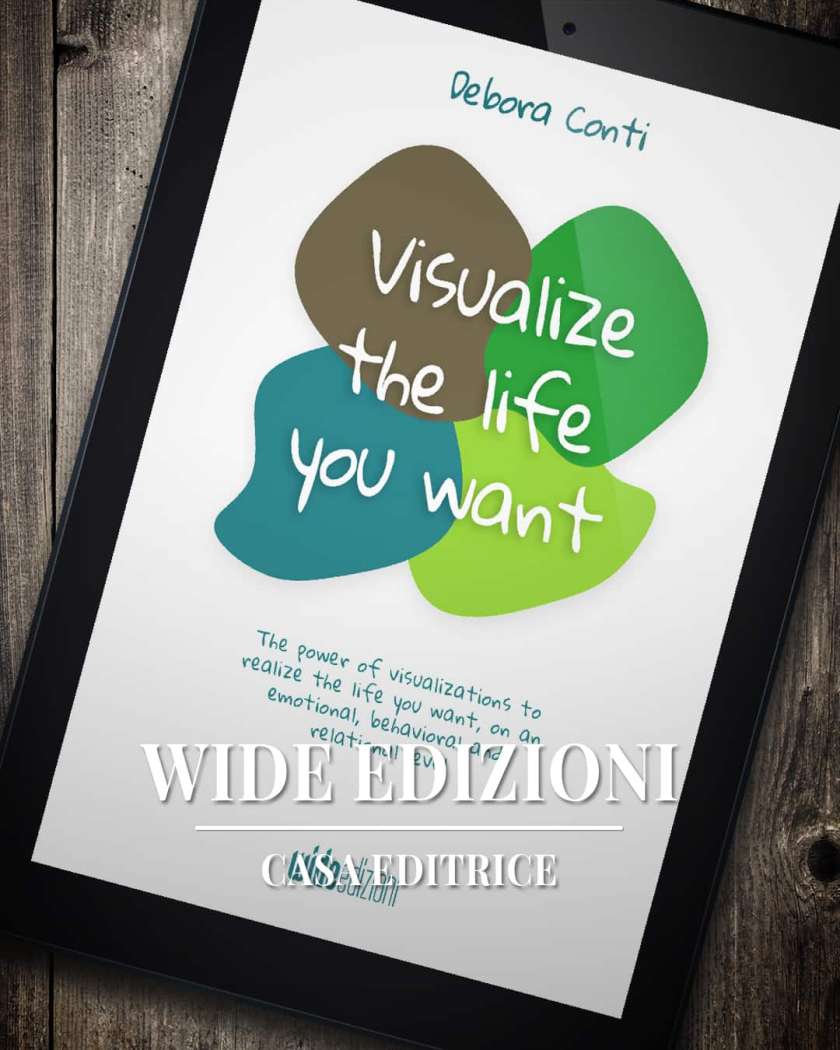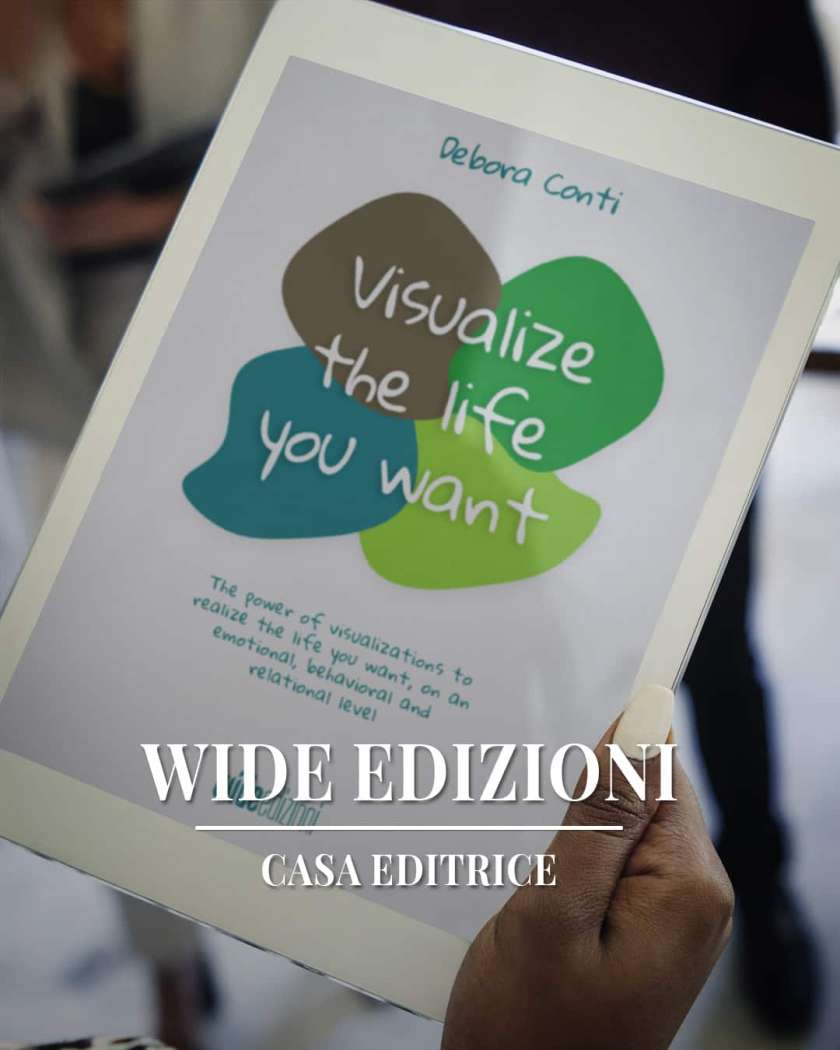Are you a reader? Find us on all online bookstores or order us at your local bookstore. Are you a bookstore? Order POD through www.totembooks.io and www.fastbook.spa.
Debora Conti
WIDE Edizioni
Visualize the Life
you Want
Visualize the Life you Want
The power of Visualizations to Realize the Life you Want, on an Emotional, Behavioral and Relational Level. Visualizing Your Dream Life: The Mindset for Success.
The power of visualizations to realize the life you want, on an emotional, behavioral and relational level. Visualizing Your Dream Life: The Mindset for Success.


 What if everything started from the mind? What if the best way to guide your
thoughts, emotions, and beliefs were precisely
visualizations? Your mind has immense power and, with this book, you will
learn the unconscious language to guide it, grow, and change as you want.
What if everything started from the mind? What if the best way to guide your
thoughts, emotions, and beliefs were precisely
visualizations? Your mind has immense power and, with this book, you will
learn the unconscious language to guide it, grow, and change as you want.
Visualizations will help you make the unconscious mind your greatest ally in living the life you want. You will be able to develop useful skills to positively change your mental approach.
But how do visualizations work? How do they transform a thought into reality? And how do you distinguish a dream from the goals planned together with your emotional mind? In practice, how do you give shape to your imagination? And make it become your life today and tomorrow...
By reading this book, you will discover the power of visualizations and learn how to use them to get what you want: to change habits, to plan the present and the future, to repair the past, to change annoying habits, and to relate better to the world around you.
Table of Contents of the book "Visualize the life you want" by Debora Conti
The Author
Every Desire… Every Visualization
What to Expect from This Book
Mayday, Mayday, I Can't Visualize!
First Part
• What Are Visualizations and What Are They For
• "Goodness, it’s so hot!" said the stowaway on the ocean liner
• The Seven Ways the Unconscious Mind Functions
• How to Speak… to the Unconscious Mind
• Two Musts Before Learning to Speak to Her
• How to Speak to the Unconscious Mind So “She” Understands You
• Fundamental Characteristics of Visualizations
• Mistakes to Avoid in Visualizations
Second Part
• Now Relax and Let Go…
• Induction Suggestions for Your Unconscious Mind
• Visualizing in the Past on the Timeline
• Memory Visualizations
• Heart Visualizations
• What Are All These Dots Doing in a Painting?
• Final Perspective Visualizations
• Process Visualizations
• When, How, and For How Long to Visualize?
• Conversational Visualizations
• Are Role Plays Visualizations?
• Are Anchors and Swish Visualizations?
Conclusions
Bibliography

Who's Debora Conti
Who's Debora Conti

 Debora Conti is an author, trainer, internationally certified
NLP Trainer by the Society of NLP, and a professional coach
with a Master's degree in Professional Coaching, registered with Renacop
(National Registry of Professional Coaches).
Debora Conti is an author, trainer, internationally certified
NLP Trainer by the Society of NLP, and a professional coach
with a Master's degree in Professional Coaching, registered with Renacop
(National Registry of Professional Coaches).
She holds two degrees with honors, in Literatures and in Psychology. She has also obtained several master's degrees, including a specialization in hypnosis and the educational method of the Yale Parenting Center, KPMT (Kazdin Parent Management Training).
She has written various personal development books and has developed specific self-help methods. She loves to share unconscious coaching in a simple and practical way.

Debora Conti
The Seven ways the Unconscious Mind Functions
The Seven ways the Unconscious Mind Functions

 The unconscious mind has its own way of functioning, which we might not always agree with. If
we don’t learn how
it works, and we wonder why it distorts reality in favor of automatic
behaviors, or why it (apparently) lacks the energy to change, or why it doesn’t support our
growth plans, we’ll remain frustrated and disappointed beings, at the mercy of unknown
mechanisms.
The unconscious mind has its own way of functioning, which we might not always agree with. If
we don’t learn how
it works, and we wonder why it distorts reality in favor of automatic
behaviors, or why it (apparently) lacks the energy to change, or why it doesn’t support our
growth plans, we’ll remain frustrated and disappointed beings, at the mercy of unknown
mechanisms.
No, we cannot reverse the roles. We will never be able to command the unconscious mind, but we can know it and guide it. We can harness its power to achieve growth and the dream life we’ve had in mind for years.
Here are the seven ways your unconscious mind functions:
- It generalizes what it learns
- It lives in the present, even in what it imagines
- It seeks pleasure
- It doesn’t judge
- It learns through the senses and strong emotions
- It learns through repetition and speed
- It seeks consistency.

Debora Conti
Past Visualizations
Past Visualizations

 If you want to give yourself tons of love, if you know that your self-esteem is low at this
moment in time, or
if you experienced various kinds of abuse in your youth and want to feel better (as much as
possible) about it,
then past visualizations are the ideal tool for giving yourself love,
strength, and perspective to nourish your
own story.
If you want to give yourself tons of love, if you know that your self-esteem is low at this
moment in time, or
if you experienced various kinds of abuse in your youth and want to feel better (as much as
possible) about it,
then past visualizations are the ideal tool for giving yourself love,
strength, and perspective to nourish your
own story.
Steve and Connirae Andreas, along with Tad James, are the NLP trainers who perfected and spread the techniques related to the timeline. Tad James made it his method: Time Line Therapy. Today, all coaches and trainers worldwide draw inspiration from them and use these visualizations focused on the past.
Dario is a loving father, but inside he’s a whirlwind of emotions. He constantly judges and criticizes himself. Dario knows who taught him to do this, and now that he is a new father, he wants to free himself from it once and for all, for various reasons. So, Dario decides to work with the tool of past visualizations. Elena is a woman whose mother has always been too critical of her. Elena feels trapped by her mother’s influence, who is still present in her life, even though she is elderly and seemingly harmless. Elena wants to break free and start over from the past.

Debora Conti
What are all These Dots Doing in a Painting?
What are all These Dots Doing in a Painting?

 What are all these dots doing in a big painting?
What are all these dots doing in a big painting?
They represent the life you want.
Process and final perspective visualizations are probably the core of this book. Learn to use both correctly and
at the right moments, and it’s done: the life you want is paved out. (Let me remind you that
the definition of
"the life you want" doesn't control external events or the people around you, only your
reactions to them).
The Big Picture
"Even if things go wrong, you always need to keep the Big Picture in mind," says Richard
Branson. "You need to
have faith in the Big Picture," says Steve Jobs, "and this approach has never let me down and
has made all the
difference in my life." The Big Picture is an overall vision of who you are, who you want to
become, and how to
get there. Given the absolute truth that "we all overestimate what we can achieve in one year and underestimate
what we can achieve in seven," the question is: do you have your own organic and structured Big
Picture? For
your life in general and for its various aspects?
The Dots
Literally, "dots" are points. For Steve Jobs, the dots are the small steps that lead to the great vision of
yourself and the dream life you want to live. Dots are nothing more than
micro-goals. A goal is a milestone, an
achievement, either short- or long-term. Pursuing a goal can take several years and is always part of the
Big Picture.

Debora Conti
Mayday, Mayday, I can't Visualize!
Mayday, Mayday, I can't Visualize!

 And if you ask me, “But Debora, it’s not working”? Without further delay, I want to immediately
address the most
common objection, one that—if present—may lead you to give up before even starting. It’s
typical; in every live
course I’ve attended, at least one person has expressed this objection. And
it’s a good thing because it gives
me the chance to clarify how things really are. If this is your case, let’s be clear: everyone can
visualize,
and now I’ll show you how.
And if you ask me, “But Debora, it’s not working”? Without further delay, I want to immediately
address the most
common objection, one that—if present—may lead you to give up before even starting. It’s
typical; in every live
course I’ve attended, at least one person has expressed this objection. And
it’s a good thing because it gives
me the chance to clarify how things really are. If this is your case, let’s be clear: everyone can
visualize,
and now I’ll show you how.
We can all use visualizations for two fundamental reasons:
One. Visualization is Inexact. The most common objections sound like these: “Debora, I can’t visualize my face [ 1], is that a problem?”, “Debora, I can’t see everything clearly, the images are blurry and distorted, is that bad?”, and finally, “But Debora, if I can’t imagine what I want, does that mean I’ll never achieve it?" The answer to all three questions is: No, absolutely not, it’s normal. For three reasons:

It’s normal not to see your own face, because it’s you, because you’re emotionally involved, and because we usually look at the world, not our own face (except in mirrors… or selfies). I suggest focusing on the details that are important to your goal, what you want to achieve. If you’re worried that you can’t visualize at all, not just faces, answer these questions: What kind of tomato do you prefer? Plum or cherry tomatoes?

Debora Conti
How to Speak… to the Unconscious Mind
How to Speak… to the Unconscious Mind

 Marianna keeps telling herself that she "has to" exercise. Does it work? No,
why? Roberto says that if people provoke him, he loses his temper. Is that enough to change?
No, why?
Marianna keeps telling herself that she "has to" exercise. Does it work? No,
why? Roberto says that if people provoke him, he loses his temper. Is that enough to change?
No, why?
Silvia wants to stop getting anxious about exams and experiencing general anxiety. Is this desire effective? You already know the answer. Finally, Elisabetta doesn’t want to fall for it again... she says this will be the last time she goes out with Antonio. Will it be true? No, why?
There you go. You’ve just seen a few examples of how not to talk to yourself effectively. You’ve also seen the many ways we all continue to talk to ourselves.
Internal Dialogue Is Not a Chat Between Friends
Let’s distinguish between dialogue with other people and internal dialogue. When you talk with friends, you can
say all the "I shoulds" and "I shouldn’ts" you want. You can complain because,
as Guy Winch explains in Emotional First Aid, complaining lowers stress.
You can gossip, make jokes about everything you do wrong, and even laugh it off because humor can diffuse tension and is therapeutic. However, when you talk to your unconscious mind, you can’t do all these things. Why? Because your unconscious mind doesn’t understand irony. It doesn’t grasp negatives. It is literal. It thinks in visuals. Let’s explain this more clearly.

Debora Conti
When, How, and for How Long to Visualize?
When, How, and for How Long to Visualize?
When, how, and for how long to visualize? These are legitimate questions. Let's address them and respond in this brief chapter. For all the types of visualization we’ve encountered so far in this book, here are some practical questions:
- How many times a day?
- And in total?
- Exactly when?
- And for how long?
- And what if after a while, it becomes boring to always visualize the same thing?

 It's always a matter of balance.
It's always a matter of balance.
Oxygen is life... Not exactly. The right amount of oxygen is life: too much
oxygen leads to hyperoxia, which
damages the lungs and neurological system. Too little oxygen... Well, try going up in a hot air
balloon at high
altitude like in the movie The Aeronauts, which is based on “the true story of the 1862 flight
of aeronauts
Glaisher and Coxwell.
At 30,000 feet, or 9 kilometers in altitude, even though Glaisher was still in the troposphere and in the presence of oxygen, he went into hypoxia and lost consciousness. I’ll leave the ending of the movie for you to discover—it’s worth it! The right amount of sunlight is life. Too much sun burns, too little sun leads to a slow death of everything. The right amount of silence fosters concentration and creativity. Too much silence leads to a sense of confusion and isolation.

Debora Conti
Consistency is the Reflection of Motivation
Consistency is the Reflection of Motivation

 We are not born consistent. Consistency or discipline is not
directly cultivated; they are reflections of
motivation. A plant grows from the seed you bought from the florist, in the
soil you chose for that type of
plant, thanks to the water it receives when you water it, and the
light that warms it every day.
We are not born consistent. Consistency or discipline is not
directly cultivated; they are reflections of
motivation. A plant grows from the seed you bought from the florist, in the
soil you chose for that type of
plant, thanks to the water it receives when you water it, and the
light that warms it every day.
The seed that becomes a plant is the consistency that I will observe in you when I see you realize your dreams; internal motivation is the soil, water, and light. You choose to water the plant. You choose to expose it to the right light.
You choose the soil. Certainly, you don’t dig up the soil every day to see what’s happening; you trust and continue: watering, checking, waiting. Consistency is the reflection of the right internal motivation, and good internal motivation is fueled by visualizations.

WIDE Edizioni loves promoting personal growth and introducing talented Italian authors who can make a difference for everyone. Follow us on Instagram and discover authors, quotes, and useful concepts, along with interviews. Grow with Wide Edizioni books: psychology, growth, self-help. Find us on Amazon and in the best online bookstores. Order our books from your local bookstore.
Contatto
Follow me on Instagram @wideedizioni
Contact us at we@wideedizioni.com
© Copyright WIDE srl 2025. VAT: IT05378370968. - Website managed by WIDE Edizioni, dedicated to the creation, development, and management of “One Page” websites. This website does not use cookies nor track traffic, we ensure a safe visit and respect for your privacy, privacy policy page.